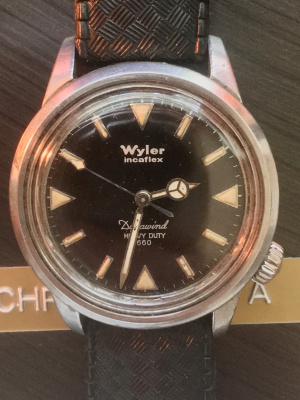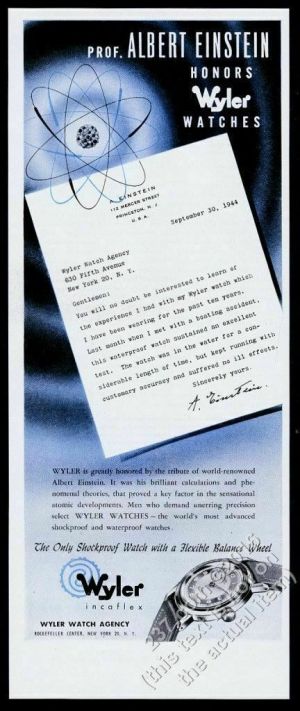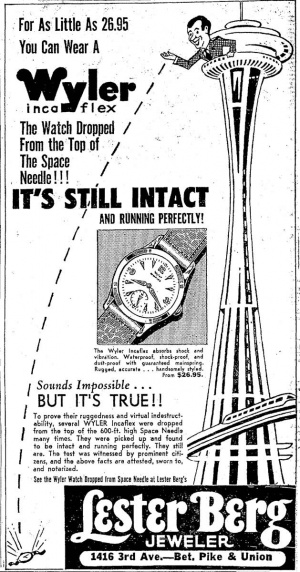Wyler: Difference between revisions
| (3 intermediate revisions by the same user not shown) | |||
| Line 1: | Line 1: | ||
[[File:Wyler.jpg|thumb]] | [[File:Wyler.jpg|thumb]] | ||
==Wyler== | ==Wyler== | ||
Also traded under the name Wyler-Vetta, Wyler Vetta and [[Vetta]]. One of the main markets was Italy during the inter-war years. Notable for the Incaflex shock absorber patent and the Heavy Duty case warterproof diver models. | Also traded under the name Wyler-Vetta, Wyler Vetta and [[Vetta]]. One of the main markets was Italy during the inter-war years. Notable for the Incaflex shock absorber patent and the Heavy Duty case warterproof diver models. | ||
There is a strong association with [[Vetta]] of Italy. Read more in the [[Vetta]] entry. | There is a strong association with [[Vetta]] of Italy. Read more in the [[Vetta]] entry. | ||
[[File:Wyler einstein ad.jpg|thumb]] | |||
==Summary== | ==Summary== | ||
Watch company founded by Paul Wyler in 1896. It was known for its rugged and shockproof movements and models. Paul Wyler gained seven patents for his innovations. In 1927 he invented the "Incaflex balance spring", which was resistant to impact, and in 1932 received a patent. The two spokes of the balance wheel had been made serpentine and of an elastic alloy. As a result, the pivot of the balance staff was better protected against lateral impact. Worldwide attention was attracted by a spectacular Wyler marketing campaign in 1956, when two watches were allowed to fall from the top of the Eiffel Tower and still functioned unchanged after the fall. The feat was repeated in 1962 in Seattle for the US market. | Watch company founded by Paul Wyler in 1896. It was known for its rugged and shockproof movements and models. Paul Wyler gained seven patents for his innovations. In 1927 he invented the "Incaflex balance spring", which was resistant to impact, and in 1932 received a patent. The two spokes of the balance wheel had been made serpentine and of an elastic alloy. As a result, the pivot of the balance staff was better protected against lateral impact. Worldwide attention was attracted by a spectacular Wyler marketing campaign in 1956, when two watches were allowed to fall from the top of the Eiffel Tower and still functioned unchanged after the fall. The feat was repeated in 1962 in Seattle for the US market. | ||
| Line 15: | Line 17: | ||
In 1937 the company caused a stir by launching a water-resistant watch that was not fitted with the conventional soft gaskets. The mineral glass was pressed in between the edge of the case and a pressed or screwed bezel, the gap between the winding shaft and the watch case was sealed hydraulically by fitting the winding shaft and bushing together, in the same material, to 1/500 mm. | In 1937 the company caused a stir by launching a water-resistant watch that was not fitted with the conventional soft gaskets. The mineral glass was pressed in between the edge of the case and a pressed or screwed bezel, the gap between the winding shaft and the watch case was sealed hydraulically by fitting the winding shaft and bushing together, in the same material, to 1/500 mm. | ||
In 1944 a letter from [[The Longines and Albert Einstein|Albert Einstein]] provided an excellent marketing opportunity. | |||
Wyler gained worldwide notoriety with a spectacular marketing stunt in 1956, when two watches were dropped from the top of the Eiffel Tower and continued to function after the fall. | Wyler gained worldwide notoriety with a spectacular marketing stunt in 1956, when two watches were dropped from the top of the Eiffel Tower and continued to function after the fall. | ||
| Line 27: | Line 31: | ||
*[[Wyler Dynawind]] | *[[Wyler Dynawind]] | ||
*[[Wyler Woodsman]] | *[[Wyler Woodsman]] | ||
*[[Wyler Lifeguard 1981-1168DA]] | |||
* Wyler | |||
* [[Wyler Vetta La Giraglia]] | * [[Wyler Vetta La Giraglia]] | ||
*[[Wyler 'Heaty Duty' Diver]] | *[[Wyler 'Heaty Duty' Diver]] | ||
*[[Wyler Navigator]] | *[[Wyler Navigator]] | ||
*[[Wyler TriSport]] | *[[Wyler TriSport]] | ||
*[[Wyler Railroad Approved]] | *[[Wyler Railroad Approved]] | ||
*[[Wyler Lifeguard]] | *[[Wyler Lifeguard]] | ||
Latest revision as of 17:18, 13 May 2021

Wyler
Also traded under the name Wyler-Vetta, Wyler Vetta and Vetta. One of the main markets was Italy during the inter-war years. Notable for the Incaflex shock absorber patent and the Heavy Duty case warterproof diver models. There is a strong association with Vetta of Italy. Read more in the Vetta entry.

Summary
Watch company founded by Paul Wyler in 1896. It was known for its rugged and shockproof movements and models. Paul Wyler gained seven patents for his innovations. In 1927 he invented the "Incaflex balance spring", which was resistant to impact, and in 1932 received a patent. The two spokes of the balance wheel had been made serpentine and of an elastic alloy. As a result, the pivot of the balance staff was better protected against lateral impact. Worldwide attention was attracted by a spectacular Wyler marketing campaign in 1956, when two watches were allowed to fall from the top of the Eiffel Tower and still functioned unchanged after the fall. The feat was repeated in 1962 in Seattle for the US market.
History

Paul Wyler was born in 1896. Wyler presented its first 16 and 19-line precision movements to the public in 1923. The particularity of these was the Incaflex balance wheel, which was legendary at the time. The Wyler Incaflex balance wheel is protected along its diameter by two curved, elastic arms, which absorb any shocks to the balance wheel.
In addition to producing his own calibres, Wyler also modified movements of other large-scale producers and sold these on to other watch companies. In some cases, the basic calibre was changed so much that the movements should actually be considered as Wyler calibres. In 1934, Wyler was the official watch of Italy's World Cup winning team.
In 1937 the company caused a stir by launching a water-resistant watch that was not fitted with the conventional soft gaskets. The mineral glass was pressed in between the edge of the case and a pressed or screwed bezel, the gap between the winding shaft and the watch case was sealed hydraulically by fitting the winding shaft and bushing together, in the same material, to 1/500 mm.
In 1944 a letter from Albert Einstein provided an excellent marketing opportunity.
Wyler gained worldwide notoriety with a spectacular marketing stunt in 1956, when two watches were dropped from the top of the Eiffel Tower and continued to function after the fall.
In 1960 manual and self-winding models from the Incaflex range became the official railway watch of the Santa Fe Railroad. In 1972, the Wyler Watch Corp. New York became a distributor for Eterna.
See Vetta for more information on Wyler.
Notable Models
- Wyler Dynawind 660
- Wyler Dynawind
- Wyler Woodsman
- Wyler Lifeguard 1981-1168DA
- Wyler Vetta La Giraglia
- Wyler 'Heaty Duty' Diver
- Wyler Navigator
- Wyler TriSport
- Wyler Railroad Approved
- Wyler Lifeguard
